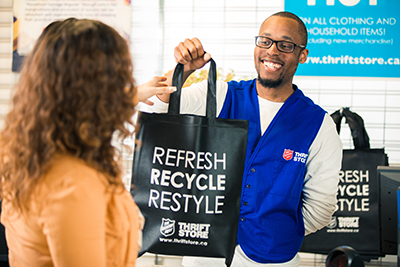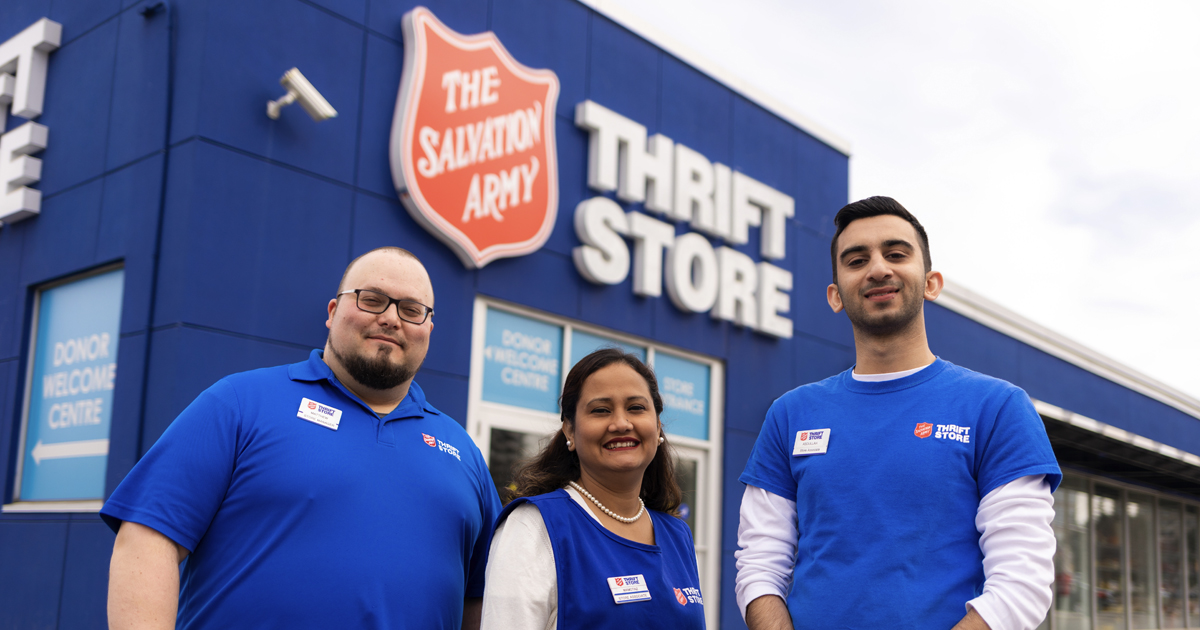The Salvation Army’s National Recycling Operations (NRO) is more than just a national thrift store chain. NRO is motivated by providing funds for the work of the Army—work that helps transform communities and people, and shares the love of Jesus.
The need for a mission-minded thrift store is not new. William Booth saw this need in his society and created the Household Salvage Brigade, a system that collected unwanted household items and clothing, and redistributed them to the community. Now, NRO continues with this model, adopting the values of The Salvation Army at every level of its operation, from the friendly and compassionate employees in stores to the territorial fundraising campaigns they contribute to in large numbers.
Across Canada, 98 stores, 115 donor welcome centres, 11 distribution centres and more than 1,900 employees mobilize to give hope, provide meaningful and dignified service, and steward resources to make a better Army and a better environment.
Hope
“Above all, NRO is a unit of The Salvation Army,” says Ted Troughton, managing director. Like other ministry units, Salvation Army thrift stores are a source of support and friendly faces for many people in the community. Some guests come in weekly and some every day. “Our staff know who they are, their stories, their families and their life struggles.”

Sherry Peters, store manager at the thrift store in Fenelon Falls, Ont., encourages the staff at her store to get to know the guests, talk to them and be there for them. “One regular comes in a couple times a week, goes to the back room to tell the staff a joke, and then he leaves,” she notes. “We’ve built a community of people here, and we’re part of their social routine.”
Beyond retail, the Red Shield on the door of each thrift store tells people it is a safe place. If somebody is in need, staff are empowered to help them. “If a person comes in wearing sandals or tattered shoes in January, our staff are welcome to give them boots, socks, gloves, hats, mittens, whatever they need. We can help people in those situations without any repercussions to the store or the manager,” says Troughton. “That is what sets us apart from our competitors and other for-profit thrift stores. We have the unique ability to do those things for our guests.”
Once, a man with dementia arrived at the Fenelon Falls store, lost, without any shoes or socks on. The team ensured he was safe at the store, found him proper shoes and waited for his wife to arrive. “Because we’re a small community, we knew who he was. It was important for us to treat him kindly and make sure he was taken care of,” says Peters.
Last fall at the Salvation Army thrift store in Fredericton, someone from the homeless population came in to ask the staff for a coat on the first cold night of the year. “They were recently homeless and they didn’t know where to go. They didn’t know the ropes. Our staff were there to help them pick out warm socks and boots,” says Marylou Nason, store manager.
In addition, the stores partner with local ministry units to connect people in need with resources—whether they require housing support, food, spiritual counselling or other services The Salvation Army can assist with. “We’re meeting human needs. That’s what we do every day,” says Nason. “We focus on being kind, having a smile. For some people, that’s the only smile they get that day.”
Service
Twenty-five years ago, Peters was a single parent with three sons, and she began working at the Fenelon Falls thrift store to help raise them. She knew that The Salvation Army had food banks and red kettles at Christmastime, but she didn’t know a lot about the mission.
“The more I learned about The Salvation Army, the more I understood that everything I do and the decisions I make are going to affect somebody I know, or somebody I may never meet,” says Peters. “The staff here learn, too. We teach them about what we’re doing and that there are different ways to change lives.”
The mission of The Salvation Army is cascaded down through the staff, beginning at onboarding and educating them. Before the pandemic, NRO took more than 1,000 staff to tour local ministry units, including food banks and shelters. “We did this so they would understand why they do what they do at the thrift stores,” explains Troughton. “Some of them had never seen our ministry units in action. It also allowed ministry units to see who our teams are, what they do and how they can help in communities.”
Now, coming out of COVID-19, NRO hopes to re-engage this experience so staff can witness first-hand The Salvation Army at work in the communities they serve.
One of the ways local thrift stores support the ongoing work of The Salvation Army at a territorial level is through their GoodWorks@Work fundraising campaigns, which began with a focus on kettle fundraisers in stores and has since grown to supporting four Salvation Army campaigns each year.
Last year, in addition to the annual kettle campaign and local community support, thrift stores raised money for the Army’s COVID-19 relief fund and Ukraine crisis response. In total, NRO raised more than $790,000 in funds through through their GoodWorks@Work initiative. Stores will contribute to the following campaigns in 2023: modern slavery and human trafficking, send a kid to camp, international development and Christmas kettles.
The small community of Fenelon Falls raised more than $3,500 to send children to Salvation Army camps in 2022. In Fredericton, thrift store staff helped raise extra money for their send a kid to camp campaign by hosting a bake sale fundraiser.
“We build displays and do announcements while guests are shopping to explain what we are raising money for, and we ask each guest if they would like to donate at checkout,” says Nason. “One year, we managed to send 11 kids from this area to camp at Scotian Glen.”
“Through our GoodWorks@Work campaigns, we’re able to bring awareness to the work that The Salvation Army does in a way only The Salvation Army could,” says Troughton.
Dignity
In the last few years and as the pandemic in Canada subsides, the cost of living continues to climb. Prices have increased and inflation is felt at every level of income, not just among vulnerable populations. Salvation Army thrift stores are seeing a marked increase in demand, with more people and new faces coming into stores in search of affordable goods. During this time, NRO has continued with their pricing strategy to support the growing need, remaining accessible in their prices while still generating profit to give back to the territory.
“We look at where we are compared to other charitable and for-profit thrift stores and we always try to stay as fair as possible in our pricing,” says Troughton. “You can come in at any price point and there is product for you, at all price levels.”
In partnership with The Salvation Army’s social services, NRO offers a territorial voucher program where individuals and families can come into stores and “purchase” items using free vouchers. Last year, more than 5,000 vouchers were distributed, providing more than $460,000 in merchandise free of charge to those in need.
“These vouchers apply to whatever it might be that they need—pants, shirts, shoes. They can come in and shop, get help and get assistance,” says Troughton. This also allows individuals to come into the store, have a normal retail experience, choose what they like and what they need, and maintain their dignity.
“Nobody has to know they have that voucher. They shop like every other person. That’s important,” says Nason. “We give people hope. They can come in and they can buy with dignity and know that they are contributing back at the same time.”
Stewardship
NRO is one of Canada’s largest national clothing recyclers with 95 percent of donated goods making a local impact at thrift stores or through their ethical recycling suppliers, and less than five percent wasted. This has a large cumulative environmental impact. Last year, NRO diverted nearly 80 million pounds of clothing and household items that would have otherwise ended up in landfills. Instead, these goods get a second life.
As an organization driven by donations, NRO operates on a goal of “more value, less waste,” using less resources to do more good. And the value of the goods purchased at a Salvation Army thrift store goes beyond the price tag. Profits are circulated back into the territory and used toward the Army’s work on the ground.
NRO seeks to reuse, repair and recycle goods responsibly and sustainably. “Anything you put in the garbage costs money. So, if we can sell it, even if we’re breaking even, we’re supporting our mission by generating funds and stewarding our resources,” says Troughton. “The Salvation Army is seen as a leader in thrift store operations, and it’s important for us to fulfil that responsibility.”










As a donor to the Salvation Thrift Stores . i would like to make a suggestion . When a donor drops off a donation at one the drop off docks, that perhaps the person receiving the goods on behalf of the thrift store might be trained to acknowledging the person dropping off the donation with a simple ‘thank you’ ,Recently I have been basically ignored when dropping off items without that simple thank you. I could donate my goods to Value Village where I have always been greeted with a warm smile and a thank you but I would prefer to support the Salvation Army‘S great work. Just a suggestion.